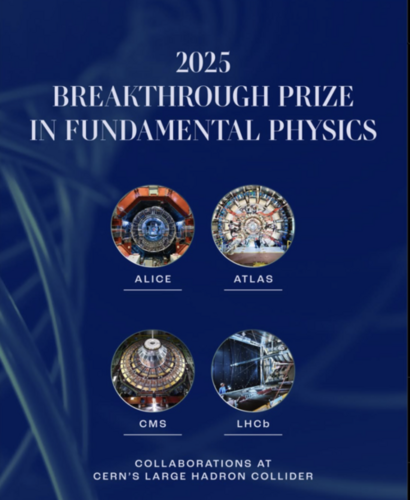
Six Wright Lab faculty members and their groups —Keith Baker, Helen Caines, Sarah Demers, John Harris, Laura Havener, and Paul Tipton—were honored for their work on international scientific experiments, receiving, along with their collaborators, the 2025 Breakthrough Prize in Fundamental Physics. The award was given to recognize four international experimental collaborations at CERN’s Large Hadron Collider (LHC)—ATLAS, CMS, ALICE and LHCb—which are driven by collaboration from scientists from around the globe.
The Baker, Demers, and Tipton group all contribute to the ATLAS collaboration. The Caines, Havener, and Harris groups contribute to the ALICE collaboration.
“The four experiments are recognized for testing the modern theory of particle physics—the Standard Model—and other theories describing physics that might lie beyond it to high precision,” wrote the Breakthrough Prize selection committee.
“By performing these extraordinarily precise and delicate tests,” the selection committee wrote, “the LHC experiments have pushed the boundaries of fundamental physics to unprecedented limits.”
Havener, an assistant professor in Wright Lab’s Relativistic Heavy Ion Group (RHIG), said, “We are thrilled to see the hard work of RHIG scientists and our colleagues over the past decade recognized through this award, which includes advances in understanding the properties and dynamics of the quark-gluon plasma and other extreme QCD phenomena produced in high energy particle collisions.”
The $3 million prize was allocated to the four experiments—ATLAS ($1 million); CMS ($1 million), ALICE ($500,000) and LHCb ($500,000)—to recognize 13,508 “co-authors of publications based on LHC Run-2 data released between 2015 and July 15, 2024.”
Havener said, “The fact that the prize was awarded to thousands of authors in ALICE, as well as the other LHC experiments, including the students, postdocs, technicians, and engineers, is a true testament to the collaborative nature of our field and demonstrates that advances in high energy nuclear physics are not just achieved by a few people but the collective efforts of many.”
In consultation with the Breakthrough Prize Foundation, all four experiments elected to donate 100% of their prize money to the CERN & Society Foundation, which will use the money to fund grants for doctoral students from member institutes to “spend research time at CERN, giving the students experience working at the forefront of science and new expertise to bring back to their home countries and regions.”
This article has been adapted from an article that appeared in the Yale FAS News on April 24, 2025.

